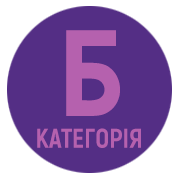MODERN METHODS OF SOFT SKILLS DEVELOPMENT CHILDREN OF MIDDLE SCHOOL AGE WITH DISORDERS OF INTELLECTUAL DEVELOPMENT: A REVIEW
DOI:
https://doi.org/10.32782/inclusion/2023.spec.8Keywords:
soft skills, children of middle school age, intellectual disorders, SEN, communicative development, social development inclusive educational environmentAbstract
The author of the article draws attention to modern scientific research in the field of pedagogy and psychology, which highlights the problems of developing “soft skills”. The methods that are already used in world practice are analyzed, as well as the latest approaches that can be adapted for use in the educational process with children who have special educational needs, in particular, intellectual development disorders, are proposed. An important component is also highlighting the practical aspects of the integration of children of this category into the social environment, which includes both school life and preparation for independent adult life. The material of the article offers an overview of modern approaches and methods for the development of soft skills, such as effective communication, empathy, critical thinking, problem solving and cooperation among children of secondary school age, especially those with intellectual disabilities. The focus is on the importance of integrating these skills into the social environment and preparing for independent living. The author analyzes a number of innovative educational programs, including “Leader in Me”, which promotes the development of leadership skills and “soft skills” in the school environment. Also considered is the “Project-Based Learning” (PBL) method, which emphasizes the involvement of students in complex projects that integrate knowledge and skills from different subject areas, and the “MindUP” program, which focuses on the development of emotional intelligence, conscious attention and positive thinking. The article emphasizes that these programs contribute to the creation of a comprehensive educational experience that prepares students for the challenges of the modern world by integrating academic knowledge with life skills. They contribute to the creation of an inclusive learning environment, taking into account the diverse needs of all students, and help children with intellectual disabilities reach their full potential and integrate into the wider educational and social environment. The content of the article is aimed at specialists in the field of special education, inclusive education, psychology and the general circle of readers interested in the issues of inclusive education and the development of children with special needs.
References
Banks, J. A. (2006). Improving Race Relations in Schools: From Theory and Research to Practice. The Journal of Social Issues, 62 (3), 607–614.
Blewitt, C., O’Connor, A., Morris, Mousa, A., Bergmeier, H., Nolan, A., Jackson, Barrett, & Skouteris, H. (2020). Do Curriculum-Based Social and Emotional Learning Programs in Early Childhood Education and Care Strengthen Teacher Outcomes? A Systematic Literature Review. International Journal of Environmental Research and Public Health, 17, 1049. https://doi.org/10.3390/ijerph17031049.
Crooks, C.V., Bax, K., Delaney, A. et al. (2020). Impact of MindUP Among Young Children: Improvements in Behavioral Problems, Adaptive Skills, and Executive Functioning. Mindfulness, 11, 2433–2444. https://doi.org/10.1007/s12671-020-01460-0.
Gee, J. P. (2008). Learning and Games. In K. Salen (Ed.), The Ecology of Games: Connecting Youth, Games, and Learning (pp. 21–40). The MIT Press. https://doi.org/10.1162/dmal.9780262693646.021.
Howley, Donal & Dyson, Ben & Baek, Seunghyun & Fowler, Judy & Shen, Yanhua. (2021). “This Is Not Gym”: Enacting Student Voice Pedagogies to Promote Social and Emotional Learning and Meaningful Physical Education. Frontiers in Sports and Active Living. 3. 10.3389/fspor.2021.764613.
J., Cheung, A. C. K., & Ni, A. (2022). The Effectiveness of Promoting Alternative Thinking Strategies Program: A Meta-Analysis. Frontiers in Psychology, 13, 1030572. https://doi.org/10.3389/fpsyg.2022.1030572.
Maloney, J., Lawlor, M., Schonert-Reichl, K., & Whitehead, J. (2016). A Mindfulness-Based Social and Emotional Learning Curriculum for School-Aged Children: The MindUP Program (pp. 3–16).
Markula, A., & Aksela, M. (2022). The Key Characteristics of Project-Based Learning: How Teachers Implement Projects in K-12 Science Education. Discip Interdscip Sci Educ Res, 4, 2. https://doi.org/10.1186/s43031-021-00042-x. 9. Stephen R. Covey (1989) The Seven Habits of Highly Effective People. Simon & Schuster. 192 р.
Shapiro Jnr., D.H., & Walsh, R.N. (Eds.). (1984). Meditation: Classic and Contemporary Perspectives (1st ed.). Routledge. https://doi.org/10.4324/9780203785843.
Shapiro, S. L., Lyons, K. E., Miller, R. C., Butler, B., Vieten, C., & Zelazo, P. D. (2015). Contemplation in the Classroom: A New Direction for Improving Childhood Education. Educational Psychology Review, 27 (1), 1–30.
Tench, P. J., Green, R., Tsemunhu, R., Nobles, K., Truby, W., & Brockmeier, L. (2021). Franklin Covey Leader in Me Program: The Impact on Quality of Work Life and Perceived Relationship Changes between Administrators and Teachers. National Youth Advocacy and Resilience Journal, 5(1). https://doi.org/10.20429/nyarj.2021.050103.
Wentzel, K.R. (1998). Social Relationships and Motivation in Middle School: The Role of Parents, Teachers, and Peers. Journal of Educational Psychology, 90 (2), 202–209. https://doi.org/10.1037/0022-0663.90.2.202.
Zhou, Chenyue. (2023). The Impact of the Project-Based Learning Method on Students. BCP Education & Psychology. 9. 20–25. 10.54691/bcpep.v9i.4603.







